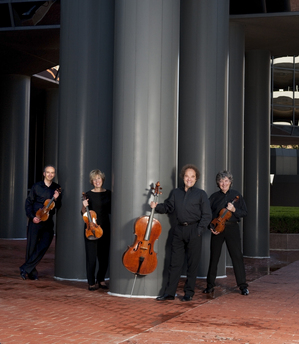Takács Quartet offers stellar Schubert program in concert at Rackham Auditorium

Takacs Quartet publicity photo
photo by Ellen Appel
“I am a friend, and come not to punish. Be of good cheer,” Death tells the Maiden in the famous Schubert song that became the basis for the composer’s “Death and the Maiden” string quartet.
Thursday evening, with the Takács Quartet on the stage at Rackham Auditorium for that quartet — and for the first of its three Schubert-themed concerts here this season under University Musical Society auspices — it was easy to be of good cheer, though Death hovered in much of the music on hand. And contrary to the assurances of the poem that sparked song and quartet, Death was as fierce as it was friendly over the course of the evening.
Of course, whether death is the subject or not, Schubert’s music is always filled with flickering shadow and light, rays of sun piercing the clouds and the heart. So in the “Quartettsatz,” the single movement of the String Quartet No. 12, the Takács players — Edward Dusinberre and Karoly Schranz, violins; Geraldine Walther, viola; and Andras Fejer, cello — followed the scrappy fury of its opening with a countervailing tonal sweetness that rendered the contrast all the more vivid. Storms erupted and were quelled before the movement’s fiery close.
The “Quartettsatz” served as a sort of prelude to the main event of the concert’s first half, the last Schubert piano sonata, composed just months before the composer’s death in 1828 and published posthumously. Pianist Jeffrey Kahane — who joins the Takács for the “Trout Quintet” later this season — was to have played, but had to withdraw because of illness. The well-known pianist Vladimir Feltsman replaced him (and will replace Murray Perahia here for a recital next month).
The sonata plumbs introspective sorrows and extroverted joys, and it seems to contemplate life as if from death. With its low, rumbling trills and bittersweet lyricism, its first movement, for example, seems to both anticipate our finality and participate in a tender present. Its second movement is one of music’s greatest and most profound journeys to consolation and acceptance of death. It is followed by a scherzo that re-immerses us in life’s whirl (though not without a melancholy reminder of what comes after) and a finale that vigorously integrates it all.
There was much to admire about Feltsman’s performance of the sonata: the Bach-like clarity of the playing, the rendering of the inner voices and counterpoint, the attacca approach that took him straightaway from second movement to third and third to last. And yet, one wished for more breath, longer line and greater tonal beauty, a less ponderous scherzo, and, above all, a more moving andante.
To be moved, though, one had but to return to the hall for the concert’s second half, which juxtaposed composer Daniel Kellogg’s meditation on Schubert’s “Death and the Maiden” with the quartet itself.
Kellogg was on hand to introduce his piece, “Soft Sleep Shall Contain You,” written for the Takács and based on the chorale from the theme-and-variations movement of the quartet. The 15-minute work is a loving essay on that chorale, fragmenting it, meditating on it with close dissonances that cede to consonance and then back again to create Schubertian alternations of light and darkness in miniature. Cello and viola ascend higher and higher till they join the violins in a realm of light, and then the sound coalesces back into a restatement of the chorale to end.
“Death and the Maiden” — Kellogg’s inspiration — concluded the program in a performance that was charged and urgent. It was a performance in which the iterations of the chorale — throbbing, singing, crying out in a tapestry of pain and solace — spoke to the soul and to how Schubert’s music can touch us. The audience gave the Takács a standing ovation. It was no mere courtesy, but richly deserved.
Susan Isaacs Nisbett is a free-lance writer who covers classical music and dance for AnnArbor.com.

